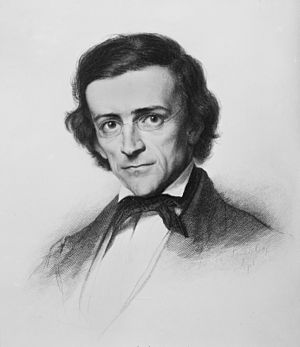Christian Matthias Theodor Mommsen (30 de novembre 1817 in Garding, Ducato de Schleswig (hodie Schleswig-Holstein) – 1 de novembre 1903 in Charlottenberg, Imperio German) esseva un historico german. Su obras super le historia roman es ancora considerate como fundamental pro le recerca contemporanee. In 1902 ille esseva premiate con le Premio Nobel pro Litteratura pro su historia roman.
| Theodor Mommsen |
|---|
   |
| Sexo |
mascule |
|---|
| Nascentia |
1817-11-30 (Garding) |
|---|
| Decesso |
1903-11-01, 1903-01-11 (Charlottenburg) |
|---|
| Loco de reposo |
Dreifaltigkeitskirchhof II[*] |
|---|
| Ethnicitate |
germanos[*] |
|---|
| Citatania |
Kingdom of Prussia[*], Duchy of Schleswig[*] |
|---|
| Educate in |
University of Kiel[*], Christianeum[*] |
|---|
| Occupation |
historian of classical antiquity[*], numismatist[*], jurista[*], jornalista[*], legal historian[*], scriptor, professor universitari[*], politico[*], epigrapher[*], classical scholar[*], classical archaeologist[*], historico[*], Germanist[*] |
|---|
| Obras notabile |
The History of Rome[*], Corpus Inscriptionum Latinarum[*] |
|---|
| Partito politic |
National Liberal Party[*], Liberal Union[*], German Progress Party[*] |
|---|
| Conjuge |
Maria Auguste Mommsen[*] |
|---|
| Infantes |
Karl Mommsen[*], Marie Mommsen[*], Konrad Mommsen[*], Ernst Mommsen[*], Hans Georg Mommsen[*], Wolfgang Mommsen[*], Lisbet Mommsen[*] |
|---|
| Parentes |
patre Jens Mommsen[*] |
|---|
| Fratres/sorores |
Tycho Mommsen[*], August Mommsen[*] |
|---|
| Premios |
Premio Nobel pro Litteratura, Pour le Mérite for Sciences and Arts order[*], Bavarian Maximilian Order for Science and Art[*], honorary citizen of Rome[*] |
|---|
| Lingua |
latino, lingua grec ancian, germano |
|---|
| Identificatores |
|---|
| ISNI |
0000000120988990 |
|---|
| VIAF |
7402506, 3265158915894450000001 |
|---|
| Commons |
Theodor Mommsen |
|---|
In un commento super le legenda del fundation de Roma antique per su prime rege legendari, Romulus, Mommsen diceva: "Le fundation del citate... como le legenda assume, es naturalmente ser considerate impossibile: Roma non era erigite in un die."[1]


